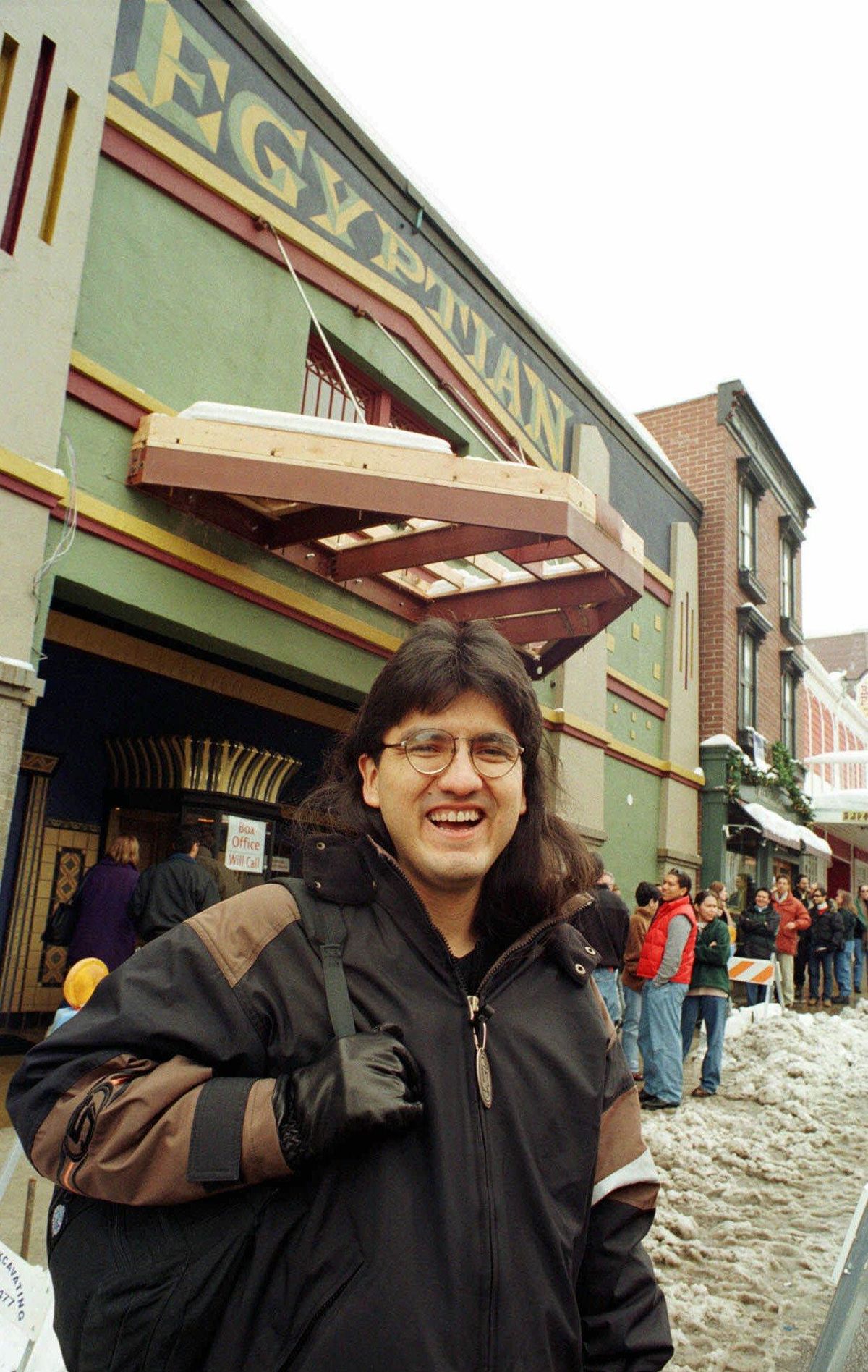‘Smoke Signals,’ filmed in Spokane and written by Sherman Alexie, named by Library of Congress to National Film Registry

A film made in Spokane and the Inland Northwest now has a place on the list of the most important movies made.
“Smoke Signals,” the 1998 independent film written by Sherman Alexie based on his acclaimed story collection, “The Lone Ranger and Tonto Fistfight in Heaven,” was named to the National Film Registry on Wednesday by Librarian of Congress Carla Hayden.
The film was heralded as the first feature film to be written, directed and co-produced by American Indians. Directed by Chris Eyre, “Smoke Signals” was set on the Coeur d’Alene Reservation and filmed in North Idaho, Spokane and Eastern Washington. The film follows estranged friends Victor Joseph (Adam Beach) and Thomas Builds-the-Fire (Evan Adams) as they road-trip to Arizona to retrieve the ashes of Victor’s father, who had left his family years before.
The top-billed cast was rounded out by established Native actors Gary Farmer (“Powwow Highway,” “Dead Man”), Tantoo Cardinal (“Dances With Wolves,” “Wind River”) and Irene Bedard, who voiced Pocahontas in the animated Disney feature, among her many credits.
In his review, former Spokesman-Review movie critic Dan Webster acknowledged the film’s ragged, indie-flavored edges, but found much to admire.
“The straightforward plot, like Alexie’s books and stories, is not as important as the film’s texture. It’s what occurs in the seams that gives ‘Smoke Signals’ its power,” he wrote in 1998. “Those seams reveal the scenarios of everyday life on the reservation, portrayed in Alexie’s trademark mix of comedy and tragedy.”
The New York Times’ Janet Maslin praised the film, too: “Here is a first feature from Chris Eyre, a 28-year-old Cheyenne-Arapaho filmmaker, that has an American Indian cast and outlook. And it needs no dispensation for novelty: it stands beautifully on its own merits. Eyre presents an inviting, affectionate and witty look at contemporary Indian lives,” she wrote, while concluding, “Though this is very much a first feature, ‘Smoke Signals’ shows colorful style and a wisdom beyond precocity about its setting and its people.”
“The Lone Ranger and Tonto Fistfight in Heaven” features 22 interconnected stories that tell the stories of the people of the Spokane Indian Reservation. While Alexie pulled from several of the stories in adapting his book for the screen, the story “This Is What it Means to Say Phoenix, Arizona” is the film’s primary source.
Alexie, a Spokane Indian who was raised on the reservation in Wellpinit, is an acclaimed poet and novelist. “The Lone Ranger and Tonto Fistfight in Heaven,” published in 1993, was a finalist for the Hemingway Foundation/PEN Award for new fiction, and won the Washington State Governor’s Writers Award, now known as the Washington State Book Award. His 2007 young adult novel “The Absolutely True Diary of a Part-Time Indian” won the National Book Award for young people’s literature.
Alexie, who lives in Seattle, has largely withdrawn from public life since allegations of sexual misconduct became public earlier this year.
The film won a number of awards when it was released, including a special commendation from the National Board of Review for achievement in filmmaking, an award for actor Adam Evans from the Independent Spirit Awards and two prizes from the Sundance Film Festival, the Audience Award and Filmmakers Trophy for Eyre.
“Smoke Signals,” which had a budget of $2 million, was mostly filmed on the Coeur d’Alene Reservation, with locations in Plummer, Worley, DeSmet and Tensed. Other scenes were shot in Eastern Washington. Dry Falls, at Sun Lakes-Dry Falls State Park near Coulee City, for instance, stood in for Arizona. The Phoenix bus station was played by the former Spokane Greyhound station at Sprague Avenue and Madison Street (a building now owned by Cowles Real Estate Co., a subsidiary of Cowles Co., which owns The Spokesman-Review). The Blue Bridge in Riverfront Park features prominently in the film’s final scene.
Four songs from the film’s soundtrack were written by Alexie and the late singer-songwriter Jim Boyd, a former chairman of the Confederated Tribes of the Colville Reservation.
Each year, the Library of Congress names 25 films that showcase “the range and diversity of American film heritage to increase awareness for its preservation,” according to the library’s website.
In its citation announcing the listing, the Library of Congress praised Alexie’s “witty and droll” script, and honored the film for its “funny and unpretentious look at Native Americans in the nation’s cinema and culture.”
“Native American directors are a rarity in Hollywood. After the early silent film pioneers James Young Deer and Edwin Carewe, the portrayal of Native Americans in cinema turned dark and stereotypical. These social trends started changing with motion pictures like the groundbreaking ‘Smoke Signals,’ ” the citation reads. “Beneath the highly entertaining façade, the film acquainted non-Native American audiences with real insights into the indigenous Americans’ culture.”
Also added to the registry on Wednesday were Ang Lee’s 2005 drama “Brokeback Mountain,” James L. Brooks’ 1987 comedy “Broadcast News,” Peter Davis’ 1974 Vietnam documentary “Hearts and Minds,” Steven Spielberg’s 1993 blockbuster “Jurassic Park” and Stanley Kubrick’s 1980 horror masterpiece “The Shining.”
The National Film Registry was created in 1989, under the terms of the National Film Preservation Act. Each year the Librarian of Congress selects, based on nominations from the public and in consultation with the National Film Preservation Board and the library’s film curators, 25 films that are are “culturally, historically or aesthetically” significant. The films must be at least 10 years old before they can be considered for inclusion on the list.
Among the 750 films featured on the list are iconic classics such as “Casablanca” and the “Wizard of Oz,” a few seconds of the 1891 film “The Newark Athlete,” comedies such as “Airplane!” and “Groundhog Day,” documentaries such as “Hoop Dreams” and “4 Little Girls,” and crowd-pleasers such as “Rocky” and “Toy Story.”